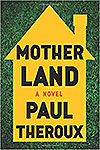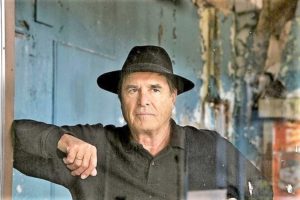Why Paul Theroux Loves Cape Cod (Malawi)
Thanks for the ‘Heads Up’ from Mark D. Walker (Guatemala 1971–73)
Q & A in The New York Times, April 16, 2018 — JCoyne
•
Why Paul Theroux Loves Cape Cod
By Dave Seminara, New York Times
As a child, the author was taken with the sunshine and beaches. He now spends every summer there because “nothing ever changes.”
For 50 years, Paul Theroux’s addictive novels and brutally honest travel narratives have inspired readers to leave  home, travel slow and with a purpose beyond sightseeing. His versatility and boundless curiosity shine in Figures in a Landscape, a new collection of essays (to be published on May 8), and in his latest autobiographical novel, Mother Land (which will be published in paperback on May 1), where Mr. Theroux takes readers to his beloved Cape Cod and deep inside the Machiavellian world of a large, dysfunctional family run by a scheming matriarch. It’s a deeply revealing and wickedly funny gem that may be the best book ever written about the interpersonal dynamics of a big family. Following are edited excerpts from a conversation with him.
home, travel slow and with a purpose beyond sightseeing. His versatility and boundless curiosity shine in Figures in a Landscape, a new collection of essays (to be published on May 8), and in his latest autobiographical novel, Mother Land (which will be published in paperback on May 1), where Mr. Theroux takes readers to his beloved Cape Cod and deep inside the Machiavellian world of a large, dysfunctional family run by a scheming matriarch. It’s a deeply revealing and wickedly funny gem that may be the best book ever written about the interpersonal dynamics of a big family. Following are edited excerpts from a conversation with him.
Why did you choose to set this novel on Cape Cod?
 The Cape is the scene of my childhood happiness. As a traveler, you look for conflicted or misunderstood or little known places — good places to write about. But the place that makes you happy as a child is one you return to — the blue remembered hills, the happy highways of the Housman poem. If you have the opportunity, you go back there to recapture that sense of serenity you had in your childhood. My childhood was late 40s, early 50s — a period when Cape Cod was small and simple. The cottage we rented didn’t have a refrigerator; there was an ice man who delivered blocks of ice for the chest.
The Cape is the scene of my childhood happiness. As a traveler, you look for conflicted or misunderstood or little known places — good places to write about. But the place that makes you happy as a child is one you return to — the blue remembered hills, the happy highways of the Housman poem. If you have the opportunity, you go back there to recapture that sense of serenity you had in your childhood. My childhood was late 40s, early 50s — a period when Cape Cod was small and simple. The cottage we rented didn’t have a refrigerator; there was an ice man who delivered blocks of ice for the chest.
I remember the sunshine, the beaches, the smell of the salt marshes. I grew up in Medford [Massachusetts], but my parents moved to the Cape, and I always wanted to come back here. And so, as soon as I had some money, around 1975, when I was living in London, I bought a house on the Cape and I’ve spent every summer here since then.
How closely does the family in this book resemble your own?
It’s about 60 percent true to real events. Some of it is word for word real. I didn’t want to hurt anyone, but on the other hand, it’s my life, what else am I going to write about? Some of the things that have happened to me are too good not to write about. I really did have a child with my girlfriend that we put up for adoption and he really did come back into my life and is a wonderful addition to the family. That happened. We went to Puerto Rico in 1961 to have the baby, just as in the book. And there’s this business of my brother Alex writing this corrosive review of my work. My sisters did indeed sell books I’d given to them. We’re a fragmented family. I’m conversational with some of them, but not to others.
Family conflicts aside, you described summer on the Cape as a fantasy of bliss, a place to lounge on hammocks, eat lobster and steamed clams, and enjoy the sound of the crickets. Is this your version of paradise?
I wouldn’t spend the summer anywhere else. I never travel in the summer. From the end of May until the middle of September, I’m on the Cape. People ask me to go to writers’ conferences or go to Brazil or write about Greenland or wherever, and I say, “No. Get back to me around Columbus Day and maybe I’ll consider it.”
Apart from the traffic, there’s no real downside here. There’s a height restriction on buildings, which is a great advantage. I live in Hawaii half the year, and there, there’s always a new building, a new road, a new business, a new tower block. Big hideous buildings blocking your view of the sea. When I come to the Cape nothing ever changes. Where I live, there’s no fast food — no McDonald’s, no Taco Bell, no KFC, just mom and pops and the Edward Hopper ambience.
The protagonist of “Mother Land” occupies his mother’s cottage on the Cape during the high season and she has the audacity to charge him for his stay. Is having a cottage on the Cape a blessing or a curse?
It’s a mixed blessing. People will want to visit you and stay there. I dislike the accumulated karma in hotel rooms, the much-used mattresses. In order to work, I like to have a place to call my own. As a writer, I don’t like to be interrupted or uprooted. I need to be in my own space.
But when you have a family sharing a cottage, it’s a nightmare. Someone decides to buy a new sofa and everyone gets charged for it. The grandchildren use it and put stains on the ceiling. I came back to my place on Cape Cod once and there were footprints all over one wall. Anything shared is problematical, especially in a big family. This is why communism is a failure I suppose. Look at any big family and you’ll see why. Read my book and you’ll see why the Soviet Union broke.


I see “Cape Cod” and it doesn’t take long to hear Patti Page singing
If you’re fond of sand dunes and salty air
Quaint little villages here and there
(You’re sure)You’re sure to fall in love with old Cape Cod
(Cape Cod, that old Cape Cod)
If you like the taste of a lobster stew
Served by a window with an ocean view
(You’re sure)You’re sure to fall in love with old Cape Cod
Winding roads that seem to beckon you
Miles of green beneath a sky of blue
Church bells chimin’ on a Sunday morn
Remind you of the town where you were born
If you spend an evening you’ll want to stay
Watching the moonlight on Cape Cod Bay
You’re sure to fall in love with old Cape Cod
If you spend an evening you’ll want to stay (on Cape Cod Bay)
Watching the moonlight on Cape Cod Bay
You’re sure to fall in love with old Cape Cod
You’re sure to fall in love
You’re sure to fall in love with old Cape Cod
Songwriters: Alan Jeffreys / Claire Rothrock / Milton Yakus
Old Cape Cod lyrics © Round Hill Music Big Loud Songs